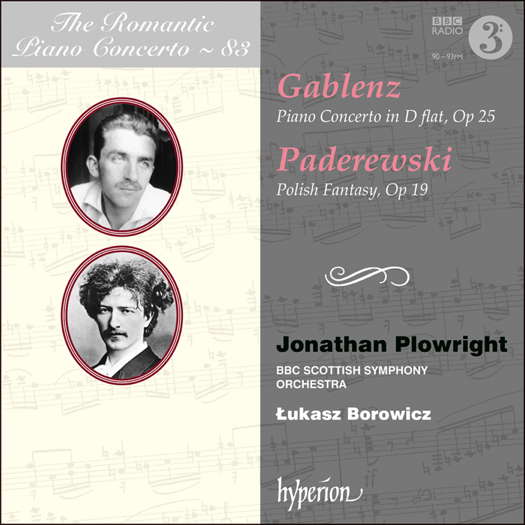 VIDEO PODCAST: John Dante Prevedini leads a discussion about Classical Music and Artificial Intelligence, including contributions from George Coulouris, Michael Stephen Brown, April Fredrick, Adrian Rumson and David Rain.
VIDEO PODCAST: John Dante Prevedini leads a discussion about Classical Music and Artificial Intelligence, including contributions from George Coulouris, Michael Stephen Brown, April Fredrick, Adrian Rumson and David Rain.

Flowing Melodies
Romantic music for piano and orchestra by Jerzy Gablenz and Ignacy Jan Paderewski, heard by GERALD FENECH
'... full of bouncy energy, exuberant flair and spectacular pianism ...'
This eighty-third volume in Hyperion's now truly historic series of Romantic piano concertos pairs together two Polish composers that stand on the opposite side of the spectrum. One is completely forgotten, the other was one of the most famous musical and political personalities of the first decades of the twentieth century.
Jerzy Gablenz was born on 23 January 1888 in Krakow. He grew up in a house saturated in music, and from an early age studied piano, flute, organ and cello. Despite showing great musical promise, the boy was not permitted to follow his desires, but was, against his wishes, enrolled at Krakow's University to study law. In 1914, Gablenz's father purchased a vineyard and mustard factory with the aim of providing an income for his only son. With the outbreak of World War I his parents and sisters left for Vienna, and the young man was left to fend for himself, something he found very difficult to manage. But in 1917 he married Margaret Schoenowna, and it was about this time that he started to compose.
Between 1920 and 1928 he succeeded in composing several worthy works, but some did not see the light of day and others remained incomplete. Between 1928 and 1936 Gablenz wrote absolutely nothing. After his father's death he devoted all his energies to the factory business, and his inability to complete works or to secure performances lingered on. On 11 November 1937 the aircraft he was flying on from Krakow to Warsaw hit a high-tension pylon and crashed. There were eight survivors but Gablenz was one of the four who perished.
The piano concerto dates from 1926 and it is quite a work, full of melodic invention and thrilling virtuosity. With a glorious first movement, a lyrical and imaginative second and a concluding 'tour-de-force' brimming with youthful energy, the piece truly deserves to be in the concert repertoire with other more popular works.
Listen — Gablenz: Allegro maestoso (Piano Concerto in D flat)
(track 3, 0:00-0:55) ℗ 2021 Hyperion Records Ltd :
I am sure this excellent recording will win Gablenz a host of admirers.
Listen — Gablenz: Andante cantabile (Piano Concerto in D flat)
(track 2, 0:00-0:58) ℗ 2021 Hyperion Records Ltd :
From an obscure Polish composer to a renowned one. Ignacy Jan Paderewski was born on 6 November 1860. Between 1872 and 1878 he studied piano, harmony and counterpoint at the Warsaw Music Institute, and in 1879 he published his first composition, an Impromptu for piano. In 1880 he married fellow student Antonina Korsak, but tragedy struck a year later when she died in childbirth, and his son Alfred remained an invalid all his life. Following this harrowing period he continued his studies in Berlin, and befriended such great names as Richard Strauss and Anton Rubinstein. By 1891 he had made a name for himself as a great concert pianist, and performed in concerts in most European cities and even in the USA. Indeed, it was in Boston in 1909 that Paderewski premiered his only symphony in B minor.
With the outbreak of the First World War the composer started to get more involved in his country's political destiny, and by 1918 he had given over three hundred speeches and lecture-recitals, soliciting support for Polish casualties of war and rallies worldwide on behalf of Polish independence. In 1919 he became Prime Minister and Minister of Foreign Affairs and Poland's representative at the League of Nations. He was also his country's representative at the Versailles Treaty, which restored Polish sovereignty after more than 120 years.
In 1922 he resigned from all political posts and resumed his international concert tours. His last tour of the States in 1939 was cut short due to illness, sailing for Europe on 30 May. Following the outbreak of the Second World War he was evacuated via France, Spain and Portugal, reaching New York in November 1940. He died in New York on 29 June 1941 and received a state burial at the Arlington National Cemetery. In 1992 his body was returned to Poland and buried in the Royal Crypt of Warsaw Cathedral in a ceremony attended by the Presidents of Poland and America.
Although Paderewski aspired to be a great composer he devoted only a small portion of his energies to its pursuit. He wrote several dozen works in different genres, but the kernel of his output was always dedicated to the piano, which he adored. His music has an abundance of flowing melodies, and most of his pieces reflect the singing quality of his playing. He also utilized Polish dance rhythms profusely, and his penchant for colour is overtly evident in many of his works.
The Polish Fantasy in G sharp minor was composed in 1893 and was first performed at the Norwich Festival of that same year. Its great success induced the composer to add it to his concert repertoire, and with its expressive themes and Polish folk influences permeating the piece, it is no wonder that it has become one of the composer's most popular works.
Listen — Paderewski: Vivace ma non troppo (Polish Fantasy)
(track 5, 0:32-1:06) ℗ 2021 Hyperion Records Ltd :
Although one piece, the Fantasy can be divided into four distinct movements where one can hear rhythms pertaining to an oberek, a krakowiak and a modified polonaise in duple meter.
Listen — Paderewski: Allegro giocoso (Polish Fantasy)
(track 7, 7:50-8:47) ℗ 2021 Hyperion Records Ltd :
Jonathan Plowright's performances are just awesome. Indeed, they are full of bouncy energy, exuberant flair and spectacular pianism, and yet the wit and charm of these scores are always kept in constant perspective. Another feather in the cap in this Hyperion cycle which keeps churning up one gem after another.
Copyright © 26 June 2021
Gerald Fenech,
Gzira, Malta

CD INFORMATION: THE ROMANTIC PIANO CONCERTO - 83



